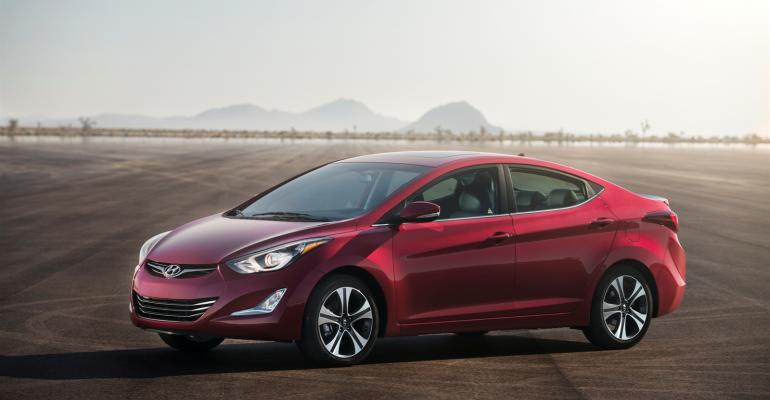Hyundai/Kia agrees to pay $360 million in civil penalties to resolve the U.S. government’s investigation into the automaker’s 2012 fuel-economy and emissions restatements.
Part of the penalty is a record $100 million fine for violating the U.S. Clean Air Act, the EPA says. Hyundai says its portion of that settlement is $56.8 million.
Hyundai/Kia also will relinquish $210 million worth of greenhouse gas emission credits and spend $50 million to form a group to independently test the fuel economy of its models.
The Korean automaker announces Nov. 3 it reached a deal with the EPA and the California Air Resources Board to resolve the investigation into Hyundai/Kia mileage estimates.
Investigators forced the automakers to lower by an average of 1-2 mpg (0.4-0.9 km/L) the combined fuel economy of roughly 1 million ’11-’13 model Hyundais and Kias sold in the U.S.
Hyundai/Kia also will relinquish 4.75 million greenhouse-gas emission credits, worth $210 million and of which Hyundai’s portion is 2.7 million. Hyundai says this represents the difference between the original and restated emission data for the vehicles and adds it holds a surplus of 20 million GHG credits.
“Hyundai has acted transparently, reimbursed affected customers and fully cooperated with the EPA throughout the course of its investigation,” David Zuchowski, president and CEO of Hyundai Motor America says in a statement. “We are pleased to put this behind us and gratified that even with our adjusted fuel-economy ratings Hyundai continues to lead the automotive industry in fuel efficiency and environmental performance.”
The U.S. arm of Hyundai blames erroneous fuel-economy ratings from ’11-’13 on a “data-processing error” and the faulty “regulatory interpretation” related to coastdown testing as the method used to calculate a vehicle’s resistance or road load.
The EPA says, “Hyundai and Kia restricted their testing to a temperature range where its vehicles coasted farther and faster and prepared vehicle tires for optimized results.
“In processing test data, Hyundai and Kia chose favorable results rather than average results from a large number of tests,” the agency says. “In certain cases, Hyundai and Kia relied predominantly on data gathered when test vehicles were aided by a tailwind.”
Hyundai says in October 2012 the EPA approved Hyundai’s new fuel-economy testing program, adding the EPA “has acknowledged the variability of its coastdown testing and currently is working to develop new guidance for the industry in order to improve its precision, repeatability and accuracy.”
As part of the resolution with the EPA and CARB, Hyundai/Kia must form an independent group to oversee the fuel-economy testing of its models. Hyundai also will plan to continue audits on ’15-’16 model vehicles “to confirm the accuracy of their fuel-economy ratings.” The independent testing is expected to cost the automaker $50 million.
In this year’s EPA Fuel Economy Trends Report, Hyundai/Kia was not ranked due to the ongoing investigation. However, their figures were reflected in the ’13 industry fleet average of 24.1 mpg (9.8 L/100 km).
Figures using corrected data and placed in a footnote show Hyundai would have led the industry with a 29.0-mpg (8.1-L/100 km) average for ’13. Mazda is the officially stated winner for ’13, with a fleet average of 28.1 mpg (8.4 L/100 km).
Kia would have tied Honda for second on the list with a 27.4 mpg (8.6 L/100 km) fleet fuel economy for ’13.
As part of the restatement announcement in November 2012, Hyundai immediately launched a lifetime reimbursement program that included distributing debit cards to affected owners to cover increased fuel costs, with the stipulation they must visit their dealer to have their fuel economy confirmed.
Some owners took exception to the program and launched a class-action lawsuit for a lump-sum option against both Hyundai and Kia. Hyundai/Kia settled the suit in December 2013 for $400 million, with the average payout per Hyundai owner reportedly $353 and average payout per Kia owner of $667.





